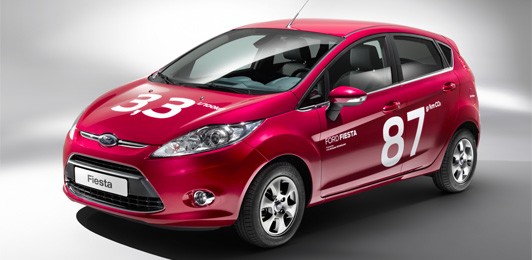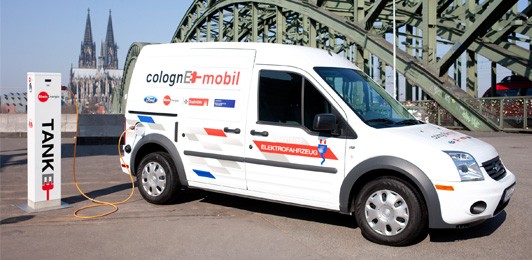Ford of Europe
Climate Change, Environment and Water
Ford is focused on minimizing the environmental impacts of our vehicles and operations, including reducing our contribution to climate change.
Ford is committed to doing our share to prevent or reduce the potential for environmental, economic and social harm due to climate change. We have a science-based strategy to reduce greenhouse gas (GHG) emissions from our products and processes that focuses on doing our share to stabilize carbon dioxide (CO2) concentrations in the atmosphere. We have also made a commitment to deliver the most fuel-efficient vehicles in every market in which we participate.
Ford of Europe continues to make significant strides toward our target of reducing CO2 emissions from all of our vehicles. By 2010, we had already reached an average CO2 emission level below 137 g/km, with 65 percent of our vehicles recording an average of around 121 g/km, or 5 g/km better than the target requested by the European legislation for 2012.
EcoBoost Engines and ECOnetic Technology
This year saw the introduction of the new 1.0L EcoBoost® gasoline engine into Ford’s lineup, joining the 1.6L and 2.0L EcoBoost engines.
EcoBoost engines use turbocharging and direct-injection technology to produce levels of performance that are usually associated with larger-capacity engines. The 1.0L EcoBoost, for example, offers the power of a traditional 1.6L gasoline engine but with a CO2 level as low as 109 g/km. This engine was launched in the Ford Focus in early 2012, making it the most fuel-efficient gasoline car ever offered by Ford of Europe. The 1.0L EcoBoost will later be offered in the Ford C-MAX and the all-new Ford B-MAX, where it is also set to achieve best-in-class CO2 levels.
Ford also continues to expand the availability of our low-CO2 ECOnetic Technology. In 2012, for example, we launched Ford’s most fuel-efficient passenger car ever – the Ford Fiesta ECOnetic Technology, offering fuel economy of 3.3L/100km and with just 87 g/km of CO2. This model includes a range of Ford ECOnetic Technology features, including revised gear ratios, a special aeropack to improve aerodynamics comprising undershield wheel deflectors and low rolling resistance tires, a variable oil pump, a more efficient air conditioner, cooling fan and alternator, as well as friction and combustion improvements in the engine. It also features Auto Start/Stop, smart regenerative charging, EcoMode and a shift indicator light.

The Ford Fiesta ECOnetic
The Fiesta ECOnetic Technology will be joined later in 2012 by the Focus ECOnetic Technology, which will emit just 88 g/km of CO2. To reach this class-leading level, the Focus ECOnetic Technology employs a 1.6L Duratorq TDCi diesel engine, combined with exclusive technologies like a lean NOx adsorbing trap and a water-cooled charge air cooler, as well as our Active Grille Shutter technology.
Half of all Ford cars sold in Europe by the end of 2012 – and two-thirds by the end of 2013 – will carry the ECOnetic Technology badge, showing that they are leaders or among the very best in terms of fuel economy in their respective segments.
Electrification
In 2011, Ford launched its first all-electric vehicle in Europe, the Transit Connect Electric small commercial vehicle. The Transit Connect Electric, assembled by Azure Dynamics, included state-of-the-art lithium ion battery packs and achieved a driving range of up to 130km (80 miles) and a top speed of 120 km/h (75 mph).
At the end of 2012, Ford will add to our electrified lineup in Europe by introducing the Ford Focus Electric, the Company’s first zero-emissions all-electric passenger car.
In the U.K., Ford continues to work with Scottish and Southern Energy (SSE), the London Borough of Hillingdon and the University of Strathclyde on the U.K.’s Ultra Low Carbon Vehicle Fleet Demonstration (UKLCVD). The UKLCVD is collecting data on the performance of a fleet of 25 Transit Connect Electric vehicles, which are being driven by a mix of fleet and private users.
In Germany, Ford is working with RheinEnergie AG, the city of Cologne and the University of Duisburg-Essen on the colognE-mobil program, using a fleet of 25 electric vehicles to conduct road testing. This program is part of a much larger research effort in several German cities that is partly funded by the German government and involves multiple automakers, utility companies, universities and technology partners.

One of the colognE-mobil fleet
We believe these kinds of collaborative efforts across sectors are essential for ensuring customer-focused products that provide the right value. They also help to ensure that the infrastructure is in place to support these types of vehicles.
Sustainable Manufacturing
In early 2012, Ford of Europe announced its 5-year sustainable manufacturing strategies for water, landfill waste and emissions. The ambitious targets embedded in these strategies would see the average Ford vehicle using 30 percent less water and creating 70 percent less waste to landfill in manufacturing over the next 5 years.
Ford’s Cologne, Genk and Saarlouis plants have already achieved zero waste to landfill. The remaining five Ford-owned sites are embarking on location-specific programs to drastically reduce, by as early as 2013, the four main waste areas that make up approximately 80 percent of their waste: paint sludge, municipal waste, grinding sludge and material filter waste. Our aim is to reduce average waste to landfill per vehicle from 5kg in 2011 to 1.5kg by 2016.
The new water strategy is expected to drive a 30 percent reduction in manufacturing water use, which is equivalent to 1,100 liters per vehicle and could alone save us €2.3 million. We will achieve this target primarily through continued metering and evaluation. Ford’s global target is to reduce water use per vehicle from 9.5m3 to 3.5m3 by 2015. Ford of Europe will reduce water use per vehicle from 3.5m3 to 2.4m3 between 2011 and 2016.
Later in 2012, Ford of Europe will also outline its strategy on energy use and purchasing.
For a discussion of our global climate change impact and commitments, please see the Climate Change and the Environment section.
For a discussion of our global commitment to water issues, please see the Water section.
“Initiatives such as the UKLCVD and colognE-mobil are a revolution for both the utility and automotive industries. Collaborating across sectors is essential to ensure customer focused products that provide the right value along with the readiness of the infrastructure. We need to work and learn together and Ford is very pleased to be a part of these important trials.”
Stephen Odell, Chairman and CEO, Ford of Europe
